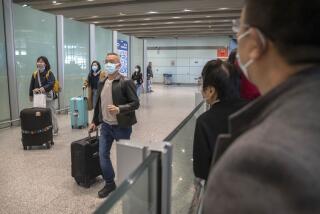Taiwan eases up on mainland Chinese visitors
Reporting from Taipei, Taiwan — Mainland Chinese visitors to Taiwan, you may now get off the tour bus.
After decades of estrangement between Beijing and Taipei, trade talks in 2008 paved the way for mainland Chinese to visit the island for the first time en masse. But security-minded island officials insisted that they travel only in tightly controlled groups that set packed itineraries and allow little time for meeting people.
The rules changed June 28, giving as many as 500 people per day freedom to travel as they wish for a deeper understanding of scenic, historically charged but culturally similar Taiwan.
Taiwan is looking to the free-roaming tourists for an economic boost, while China is hoping that contact between travelers and locals will help lead to eventual political unification with Taiwan, which Beijing considers a renegade province.
Scholars say goodwill should improve as each side learns to see the other’s gentler characteristics, reinforcing the impetus to get along despite strong political differences and an ominous military buildup.
“Generally people here are friendly and easy to get along with. But the Chinese think the Taiwanese are fighting dogs,” said George Tsai, a political scientist at the Chinese Culture University in Taipei. In turn, he said, “we will see that the Chinese are not as depicted in the media, not so vicious.”
Since Taiwan opened up three years ago to group excursions from the mainland, Chinese tourists have pumped $3.8 billion into the island’s struggling service sector. There has been the odd friction, such as yelling in restaurants or bargaining too hard on souvenirs, but none of the visitors have overtly spied on Taiwan or overstayed travel permits to work illegally, as was once feared.
Taiwan and China have been separately ruled since 1949, when Chiang Kai-shek’s Nationalists lost the Chinese civil war and fled to Taiwan, where they set up a government outside Communist Beijing’s control.
Beijing has threatened to use force to bring Taiwan into its fold but prefers peaceful means, such as tourism, which reinforces the shared Chinese culture.
But the practice of tightly controlling mainland tourists has barred close contact between the 23 million Taiwanese and the 2.3 million Chinese who have visited the island in the last three years, people in the travel industry say.
Group tours normally cover five to 10 attractions within a week, leaving little time to get close to locals.
“We’re on a tour, so we’re not meeting a lot of people, just in some of the stores,” said Yao Lifang, 29, a high school teacher in China who took a rushed six-day Taiwan tour in June. “But I can tell they’re polite and of high quality.”
The two governments agreed last month to let in independent travelers for as long as 15 days each. To discourage overstays, solo tourists must “prove” annual wages of at least $17,000 or $7,000 in savings, and at first will be limited to residents of three well-off cities: Beijing, Shanghai and Xiamen.
Independent travelers are expected to seek out more of Taiwan than the best-known tourist spots, meaning more interaction with people and a deeper understanding of life here, from urban Taipei’s back alleys to aboriginal hamlets in the mountains.
“They want to understand real life in Taiwan, as the two places [China and Taiwan] aren’t the same in terms of the people’s outlook and lifestyle,” said Chen Chiong-hua, spokeswoman for the Tourism Bureau in Taiwan. “We’ve been separated for so long that travel becomes a soft means of dialogue.”
Taiwanese merchants will welcome the Chinese, who are known for lavish shopping while on tours, and the travelers will find the Taiwanese refreshingly polite when doing business, Tsai said.
Talk between Taiwanese and tourists may touch on such similarities as their ethnic Chinese background and shared language, but may bring out differing views on politics and social ordering.
Conflicts already occur when Taiwan’s steadfast followers of Falun Gong, a spiritual movement banned in China, target tourist groups to criticize the Communist government, or when the tourists yell in public or ignore hygiene.
“Even if there are some conflicts,” said Li Peng, assistant director of Xiamen University’s Taiwan Research Institute in China, “that’s part of the process of understanding.”
Jennings is a special correspondent.
More to Read
Sign up for Essential California
The most important California stories and recommendations in your inbox every morning.
You may occasionally receive promotional content from the Los Angeles Times.










